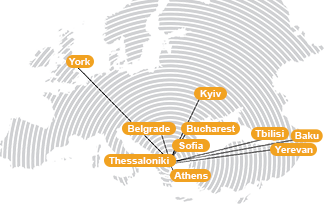According to Eurobarometer, 83% of Europeans value knowing other languages yet 44% cannot hold a conversation in another language. With globalisation and increasing migration, multilingualism is critical to intercultural understanding and cohesion in society, job prospects for individuals and competitiveness in Europe.
What Is Language Rich Europe?
Through fresh research, a pioneering new tool – the Language Rich Index – measuring multilingual policies and practices, and a network of partners, the project seeks to capture the attention of leaders in government, business and society across Europe:
- Illustrate the current situation, highlighting good policy and practice and enabling informed policy choices
- Inspire new language focus among decision makers by illustrating the importance of languages in stable and prosperous societies
- Motivate more learners / users of many languages
Language Rich Index: New research will create a baseline for support for language education and multilingual services across countries and industries with clear, comparable information that can be tracked over time. It will include:
- Pre-primary and primary education
- Secondary education
- Higher Education and vocational training
- Public services and spaces
- Business
- Media
- National databases on language diversity
Language types studied will be official state languages, foreign languages, regional minority languages and immigrant minority languages.
Essays highlighting specific national contexts will complement the data collected in each country.
Analysis: Using the Index, LRE will determine:
- Best practices: Which European recommendations are being followed and work well? Which do not work and why?
- Correlations between good practice in one area and success in another area
How Will The Information Be Used?
With our expert partners we will build networks of professionals from all sectors covered by the Index, both at an international and national level.
The research and language profiles of each country will be launched and promoted through:
- Publications in 18 languages, interactive website
- Articles and interviews in the media
- Student network of over 2 million EUNIC language learners
- New professional network of over 1200 decision makers across sectors
- 21 major national launch events (in 19 countries, 2 regions), 84 workshops on improving policies and practices across Europe and 21 action plans (national / regional / local level)
- Final paper summarising recommendations
- The impact of the project will be tracked in subsequent editions






